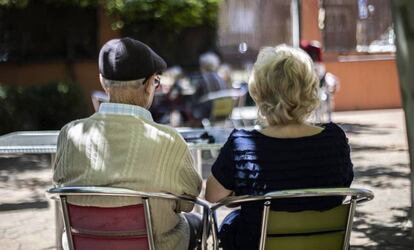No visits or Christmas outings: The plight of seniors in Madrid’s nursing homes
Guest books from 11 facilities show that 60% of residents received no visitors in summer, and only 16% were taken out for the festive season


The more free time the families have, the less time they spend with their most senior members. That’s one of the sad conclusions reached by a recent study on loneliness among senior citizens in nursing homes in Spain.
Only 40% of residents in 11 centers in the south of the Madrid region received visits between January and June in 2019. During the summer months – between July and September 15 – the figure dropped to 15%, according to the Acumafu seniors cultural association in Fuenlabrada, in the Madrid region.
Many people have swapped a visit to see their grandparents for a soccer match or going out for a drinkAcumafu president Marcelo Cornellá
The figures are based on the nursing home’s visitor records from 2019 – each residence is legally obliged to keep such records, but they are not for public access.
At Christmas, the situation is similar to summer. Only 36% of nursing home residents at the 11 centers received visits during the recent Christmas holidays, and only 16% were picked up to enjoy the traditional Christmas Eve dinner at home. On New Year’s Eve, the figure dropped to 11%, while just 4% of seniors spent King’s Day – January 6 – with their families. According to Acumafu, only 1% received gifts for King’s Day that were not clothes, for instance, jewelry or perfume.
These visitor records are one of the few pieces of data in Spain that shed light on the issue of loneliness among seniors living in care, according to experts, who say that more research is needed to assess the problem.
Members of Acumafu believe that the figures reflect the individualism of Spanish society. “Many people have swapped a visit to see their grandfather or grandmother for a soccer match or going out for a drink,” says Marcelo Cornellá, president of the association. “This is part of our upbringing. For a Latin American person, treating the elderly as we do would be inconceivable,” he adds.
Acumafu has been entertaining seniors with magic shows and flamenco performances for almost 10 years, as well as offering a consulting service that broaches thorny issues such as how to disinherit children. While helping out at the nursing homes, they were struck by the amount of talk among the nurses about seniors left alone at Christmas, and made it their business to gather more information. The nursing homes are located in the municipalities of Pinto, Getafe, Fuenlabrada, Leganés, Parla, Ciempozuelos, Móstoles and Morata de Tajuña and house a total of 1,203 elderly citizens.
There are many families that don’t botherMiguel Vázquez, president of Pladigmare
Others associations believe that the information on the 11 centers is a broader reflection of the situation in Spain. The figures suggest there are many seniors who never receive visitors, perhaps because their family has broken ties with them. “There are many families that don’t bother,” says Miguel Vázquez, president of Pladigmare, an association of the relatives of seniors living in residences in Madrid. “Just as there are others that are on top things and care. It has to do with the concept of old age as something useless, annoying and serving no purpose.”
Some experts say the figures are indicative of an “ageist” culture in which the elderly are perceived as a nuisance. But they do suggest caution be exercised when it comes to interpreting the data. Being alone is not the same as feeling lonely, which would be better assessed by actually interviewing the residents. Besides, each family is a world unto itself and some of the elderly have been abandoned due to painful and complex family traumas; nor should a nursing home be equated with abandonment, as many working families put their elderly members into care because they need 24-hour assistance.
What’s more, the high cost of nursing homes means many families have to choose residencies further from home that are more affordable, which makes visiting more difficult. For example, in the province of Toledo, which has the fifth-highest number of nursing homes in Spain, the cost of care is half of what it is in Madrid.
Solutions
Nursing homes are increasingly aware of the problem of loneliness and are working to improve the level of personal attention the residents receive. Families can be put off by the uninviting atmosphere of a home and in the last 30 years, efforts have been made to make the environment more welcoming.
Some of the solutions put forward are the co-housing model, where members share common facilities, scaling back centers, and letting residents live with their pets, according to Elisa Sala, head of the Friends of the Elderly Observatory, an association whose volunteers spend time with seniors either in their homes or in a residence. “In Finland’s residences, older people have their pets and personal photos in their rooms, but here their rooms tend to be colder, each with the same furniture and the air of a hospital,” says Sala.
David Sprowl, a US consultant working in Spain, says that many families whatever the country, think of a nursing home as an excuse to ignore the elderly. “They think someone else will take care of them and they won’t have to get involved anymore,” he says.
To combat loneliness in an increasingly aging world, a cultural change is needed, says Ana González, secretary of Social Policy and Diversity at the Workers’ Commissions union in Madrid. “Being admitted to an institution is not a guarantee of socialization,” she says. “An in-depth pedagogical study into what ageing means needs to be carried out.”
850,000 seniors live alone in Spain
The number of people over 80 who live alone at home is growing rapidly. In 2018, 850,000 people over 80 lived by themselves in Spain, according to the Continuous Household Survey from Spain’s National Statistics Institute (INE). In 2013, this number was 738,300. In Madrid, the figure has jumped from 83,700 in 2013 to 115,000 people in 2018.
“These figures are very high and concerning,” says Ana González, secretary of Social Policy and Diversity at the CCOO union in Madrid. “There is a need for measures to relieve the loneliness and the lack of protection that affects older people living alone. All the authorities should commit to such strategies, which should also involve families, companies and workers. Social organizations should also collaborate.”
English version by Heather Galloway.
Tu suscripción se está usando en otro dispositivo
¿Quieres añadir otro usuario a tu suscripción?
Si continúas leyendo en este dispositivo, no se podrá leer en el otro.
FlechaTu suscripción se está usando en otro dispositivo y solo puedes acceder a EL PAÍS desde un dispositivo a la vez.
Si quieres compartir tu cuenta, cambia tu suscripción a la modalidad Premium, así podrás añadir otro usuario. Cada uno accederá con su propia cuenta de email, lo que os permitirá personalizar vuestra experiencia en EL PAÍS.
¿Tienes una suscripción de empresa? Accede aquí para contratar más cuentas.
En el caso de no saber quién está usando tu cuenta, te recomendamos cambiar tu contraseña aquí.
Si decides continuar compartiendo tu cuenta, este mensaje se mostrará en tu dispositivo y en el de la otra persona que está usando tu cuenta de forma indefinida, afectando a tu experiencia de lectura. Puedes consultar aquí los términos y condiciones de la suscripción digital.








































